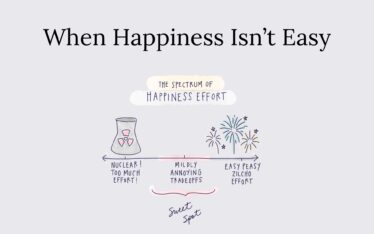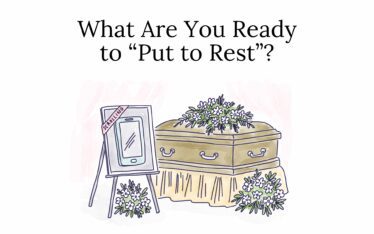(If you care about being happy.)
The single most important thing you can do to be happy at work (and life) is to figure out what you value — the things that matter to you — and then do everything you can to live your life in accordance to what you’ve listed on the back of your Starbucks napkin.
 If you can’t list within ten seconds the top ten things you judge to be important in your work and life, it’s almost impossible to expect a ten out of ten kind of life. (On some days I’m just scrapping it out for a solid six.) Let’s give ourselves a fighting chance at happiness by getting clear on what it looks like in the first place — writing out the proverbial “Recipe for the Happy You” — then finding and doing work that meets the description of each ingredient you’ve listed (and avoiding work made with ingredients that make you gag).
If you can’t list within ten seconds the top ten things you judge to be important in your work and life, it’s almost impossible to expect a ten out of ten kind of life. (On some days I’m just scrapping it out for a solid six.) Let’s give ourselves a fighting chance at happiness by getting clear on what it looks like in the first place — writing out the proverbial “Recipe for the Happy You” — then finding and doing work that meets the description of each ingredient you’ve listed (and avoiding work made with ingredients that make you gag).
It’s not rocket science, this idea of identifying our values in an attempt to feel maximally alive, yet most of us are unaware of the impact of living a life that doesn’t line up with the things that make us tick. We are adaptable creatures so we tolerate things that don’t jive with our Recipe, and then we wonder why we feel bored and anxious, why we’re drinking more than we used to, why we’re miserable and snapping at the kids, why we’re drained of energy all the time, why we’re numbing ourselves with food, why we’re always sick and taking Emergen-C, why we’re plotting our boss’s demise, why we’re feeling like we’ve sold our souls, why we’re acutely aware that something is off but alarmingly unsure what it is.
Values can be stubborn in an all-or-nothing kind of way. A majority of the ones on your ingredient list can be met, and yet the one that’s being squashed will poke at you until you do something about it. For years some of my most important values (achievement, financial security, variety, and more) were being met at work, and yet creativity, which mattered a lot, was left out of the mixing bowl.
I negotiated with myself on the ride home in traffic (often out loud), telling myself that it didn’t matter because “I was getting stuff done and it paid well, so who cares about being able to create stuff, right?” Wrong. What’s the price you’re paying by ignoring the values that matter to you?
Awareness of what we need and want helps us make better choices, which is kind of a big deal when it comes to being a functioning adult. You get to choose what to do for a living, you get to choose the path you’d like your career to take over time (unless you do something stupid like embezzle), and you get to choose how you want to spend your time (unless you’ve procreated*).
I didn’t hear that almost-audible click in my life until I consciously identified what my own Recipe included and then actually designed my life around what I said mattered. My wish for you is to make educated choices based on what actually matters to you. Ignorance is never bliss when it comes to knowing what makes you happy.
1: What matters? What do you value?
Values are squishy little buggers, because they aren’t things we do or have. They aren’t inherently good or bad. Values are best identified by thinking of a time in your life when you were utterly satisfied and fulfilled. What were you doing, and what values can you pull out of that time? Think of a time at work when things were going swimmingly. What values were being demonstrated?
For example, you might remember a time when you were drinking from a fire hose of knowledge and soaking up every last drop of information like a sponge, like an early job when you had so much to learn. Personal growth might be a value to add to your ingredient list.
Values can also be identified by getting curious about the stuff that ticks you off or stresses you out, too. I learned that harmony is one of my top ten values after reflecting on how every incident of conflict felt like a punch in my stomach. Now I know I can’t work (well) with or for people who love a good argument. If you value harmony too, it’s possible you’ll wither in an environment with cross-departmental tension and gossip.
Valuing candor (authenticity, transparency, directness), for example, means that you’ll have a tough time in an environment where communication isn’t free-flowing and open. You need an open book manager or at least a company that clearly shares its vision and strategy.
If you value recognition, you’ll want to explore jobs with lots of advancement opportunities, or at the very least work for a boss who is game to pat you on the back when it’s well-deserved. Avoid jobs where your efforts are swallowed up into the abyss and no one shines the spotlight on how awesome you are.
If relationships are high on your value list, find a job where the people you work with are friendly, and where you can help them with what they do.
2: Reality check on your values
Rank your top ten values in order of importance, and answer this question for each and every one: to what extent are you able to demonstrate or step into these values on a really regular basis?
What values are competing? You might love financial security but you also might love adventure, which means that you might not hold a job for long periods of time in between three-month stints in exotic rainforests. What do you value more, today? It’s a prioritization exercise every step of the way, making decisions based on the things that matter most to you now, which might be different a few months from now.
3: How do your values apply to work?
If you’re looking for a job, spend as much time checking out whether your values will be a match as you do about the job description during your research and interview stages.
- Ask pointed questions, like “Flexibility is really important to me, as I know I do my best work in those kinds of environments. What does that look like in this kind of role?” It’s impressive to show you know what makes you tick.
- Never, ever, ever pretend to be the kind of person you’re not, just to get the job. “Sure, I love working as a team!” is the wrong kind of answer for the gal who’s competitive and wants to win on the merit of her own individual work. You might get the job if you morph your values but it’s just a matter of time before you realize your soul has been sold.
If you’re in a role that’s not aligned with what you value, take action.
- Assess where the value that matters to you is being suffocated. Is it the job, the boss, the department, the branch, the company?
- Oftentimes, the company’s cool, but the boss is the one who steps on your values (wittingly or unwittingly). If you value family as a number one ingredient and your boss expects you to work over time and every other Saturday, a frank discussion is in order. Talk about how you do your best when you’re operating on all cylinders, which for you means a more balanced schedule.
Take control.
- Action is part of your Recipe, and you’re in a role/department/company where things move slowly. What can you do to help reorganize things to speed things up? Who can you talk to about helping to revamp some of the processes? How can you build activities into your job that do honor that value?
What undeniably matters to you? Identifying your top ten and creating your personal Recipe for Happiness takes a tiny investment of time and reflection, yet is the gift that keeps on giving. Commit to making decisions based on your values and you’ll reach that feeling of rightness. Ignore the things you know to be important and don’t be surprised by the pervasive feeling of wrongness. Come on! You deserve what’s right! (Now that sounds a lot like the value of justice.)
This isn’t about learning how to compromise, it’s about figuring out how to make things work. Sometimes it’s about re-contracting the work you do, ranging from some job description items to the entire job itself. If your boss thinks you’re valuable and willing to contribute more, she or he will likely be willing to work with you on a new reality that matches your Recipe.
* I’ve heard that kids take up a bit of time until they’re five, at which point you can leave them home alone for extended periods of time.







